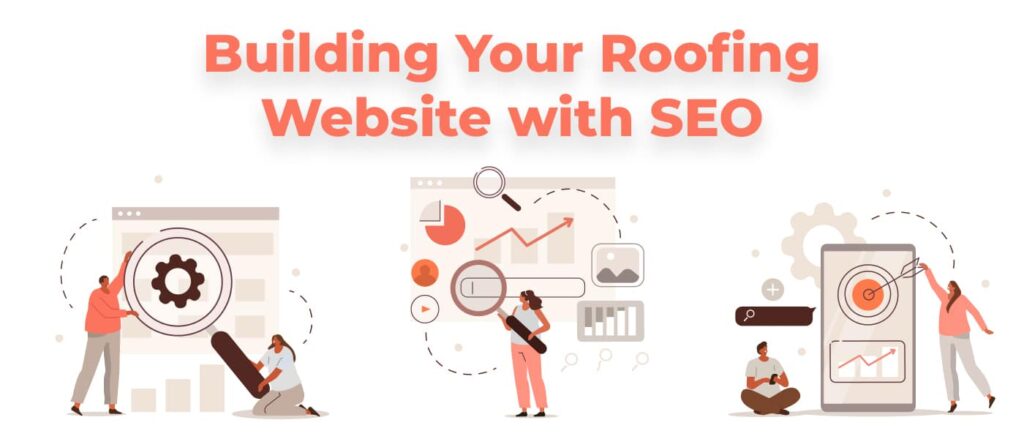On-Page SEO for Your Roofing Website
Search engine optimization isn’t just about the content and linking. Other parts of your website and page headings can inform Google and other search engines about relevant keywords and how important each keyword is to your roofing business.
Google hundreds of ranking factors factors, like alt tags, linking structure, sitemapping, and schema all contribute to how you score each keyword’s importance on each page.
For example, if you tell Google “roofer in Memphis, TN” is the primary keyword for your home page, but Google also finds “roof repair,” “roof replacement,” and “insurance claims assistance” on your home page, it could reduce the ranking for “roofer in Memphis, TN.”
You can emphasize the importance of your main keyword in other places on a page that aren’t immediately visible to human visitors, but will make a big difference with digital search engine crawlers.
Image Attributes and Alt Tags on Your Roofing Company Site
Alt tags are hidden attributes in images meant to assist visually impaired visitors using screen reader devices to understand the context of images on a page. Google search crawlers may also use this information to learn more about the purpose of a page’s content.
Understanding how search engines use background information on a website can help you utilize these tools to improve your authority for specific keywords. So if you want to incorporate images of a recent asphalt shingle roof job near Atlanta onto your shingle roofing service page, consider adding an alt tag like:
“Team leader Jim and the crew just wrapped up this job installing 22 squares of architectural asphalt shingles near Atlanta on this three-bedroom, two-bathroom home in Johns Creek. We used Atlas Pinnacle® Pristine asphalt shingles in a light gray ‘Oyster’ color, and we are AtlasPRO® Certified.”
This alt tag includes several popular keywords, including the city and suburb, shingle style, shingle brand, and the service provided. Search engines will see these image attributes and rank the page higher for searches that include these keywords.
URL Link Structure Within Your Roofing Website
You need to keep your URL addresses short and easy to share, especially for your main service pages. Keep your URL formatting simple, such as yoursite.com/roof-repair or yoursite.com/services/roof-repair.
Internal Site Navigation and Linking for Roofing SEO
Link building within your site can help boost your ranking in Google’s organic search results. By structuring your site navigation to direct users to certain pages in response to their search engine queries, you build domain authority for those services or blog posts.
Google and other search engines will look at things like the anchor text you use to link between pages, backlinks to your pages from authoritative sources, and your XML sitemap for keywords and pages.
Schema and Backdoor Markup to Rank for Local SEO
Schema markup tells Google more about a page’s content. This backend coding can add more information to your Google search result’s description, including reviews, ratings, or simple FAQ responses.
The primary concern with schema markup is that while it can give you the advantage if you’re the first roofing company in your area to add it, if your competitors are using it and you aren’t, you’re at a clear disadvantage.
Include Content Marketing in Your Roofing SEO Strategy
Your roofing SEO strategy may also include creating content to appear outside of your website in a comprehensive digital marketing campaign. Your digital marketing agency can help you develop a content marketing plan to build a web of inbound links to your roofing website and build a highly rated domain authority score.
If you are managing your own roofing SEO, you’ll have to do the leg work to not only choose appropriate keywords before creating your content but also review your keyword rankings between different site pages with your Google Analytics account.
Social Media Marketing and Inbound Links to Your Roofing Website
Besides your main service pages and primary site navigation, you need a blog page to post fresh, relevant content for Google’s crawlers to inspect. Regularly posting new content with authoritative information about your keywords helps position your roofing website as the expert resource in your service area.
Is there anyone who might read content about roofing other than Google’s ranking crawlers? There are some potential readers, including prospective customers who want to verify your expertise, DIYers looking for a solution to fix a problem on their roofs themselves, and even your competitors who want to monitor what you’re doing to improve their own strategies.
When you add a new blog post to your website, you want to backlink to the new post from your social media profiles, including Facebook, Twitter, TikTok, and Instagram. This will give your existing customers and social media followers the opportunity to click through to your site to see your new content.
Third-Party Content Marketing for Local Roofing SEO
Several websites offer digital marketing space to post articles demonstrating your expertise in one of your services or how your roofing company is the local expert for your service area. These third-party content sites often have a high domain authority score, lending a stronger score for your website when you link back to your site from your article.
This is one off-page SEO strategy that a professional roofing SEO company can manage for your roofing business.
Utilizing Your Keyword Research Effectively in Writing Authoritative Content
When performing your keyword research to choose the keywords you want to rank highly for, don’t forget to review your on-page SEO rankings for your keywords every three months or so. You can update lower-ranking pages on your site to rank higher or update your better pages to try to get the top spot in the Google search results.






